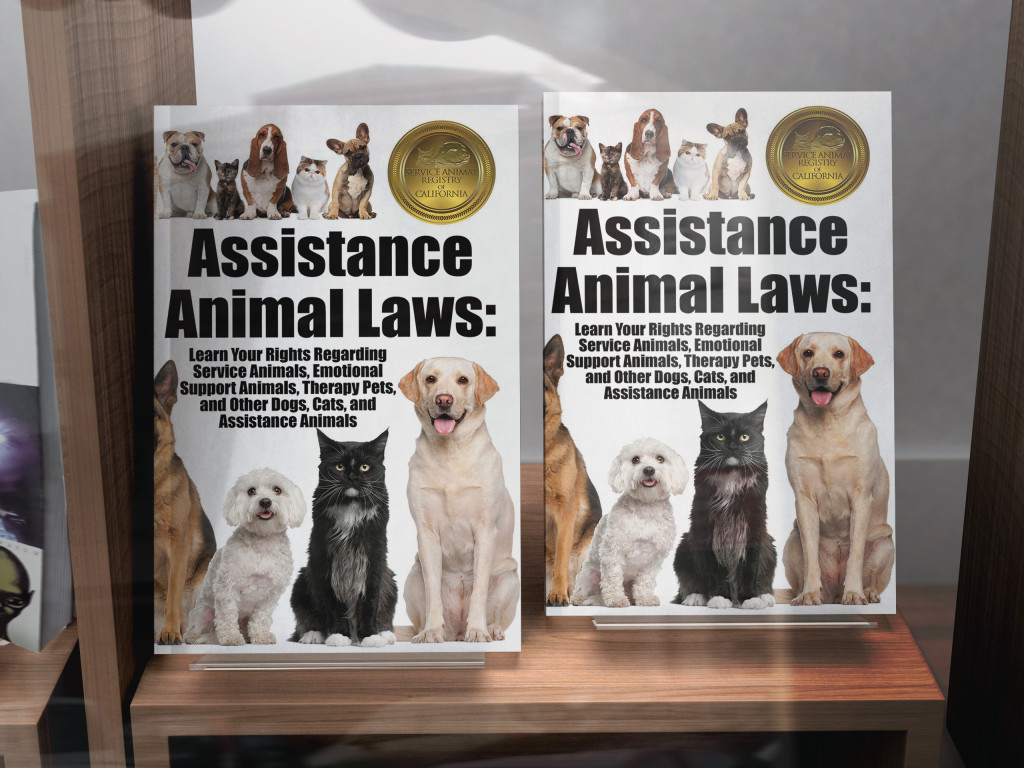COMMONLY ASKED QUESTIONS ABOUT
SERVICE ANIMALS IN PLACES OF BUSINESS
1. Q: What are the laws that apply to my business?
A: Under the Americans with Disabilities Act (ADA), privately owned businesses that serve the public, such as restaurants, hotels, retail stores, taxicabs, theaters, concert halls, and sports facilities, are prohibited from discriminating against individuals with disabilities. The ADA requires these businesses to allow people with disabilities to bring their service animals onto business premises in whatever areas customers are generally allowed.
2. Q: What is a service animal?
A: The ADA defines a service animal as any guide dog, signal dog, or other animal individually trained to provide assistance to an individual with a disability. If they meet this definition, animals are considered service animals under the ADA regardless of whether they have been licensed or certified by a state or local government.
Service animals perform some of the functions and tasks that the individual with a disability cannot perform for him or herself. Guide dogs are one type of service animal, used by some individuals who are blind. This is the type of service animal with which most people are familiar. But there are service animals that assist persons with other kinds of disabilities in their day-to-day activities.
Some examples include:
- Alerting persons with hearing impairments to sounds.
- Pulling wheelchairs or carrying and picking up things for persons with mobility impairments.
- Assisting persons with mobility impairments with balance.
A service animal is not a pet.
3. Q: How can I tell if an animal is really a service animal and not just a pet?
A: Some, but not all, service animals wear special collars and harnesses. Some, but not all, are licensed or certified and have identification papers. If you are not certain that an animal is a service animal, you may ask the person who has the animal if it is a service animal required because of a disability. However, an individual who is going to a restaurant or theater is not likely to be carrying documentation of his or her medical condition or disability. Therefore, such documentation generally may not be required as a condition for providing service to an individual accompanied by a service animal. Although a number of states have programs to certify service animals, you may not insist on proof of state certification before permitting the service animal to accompany the person with a disability.
4. Q: What must I do when an individual with a service animal comes to my business?
A: The service animal must be permitted to accompany the individual with a disability to all areas of the facility where customers are normally allowed to go. An individual with a service animal may not be segregated from other customers.
5. Q: I have always had a clearly posted “no pets” policy at my establishment. Do I still have to allow service animals in?
A: Yes. A service animal is not a pet. The ADA requires you to modify your “no pets” policy to allow the use of a service animal by a person with a disability. This does not mean you must abandon your “no pets” policy altogether but simply that you must make an exception to your general rule for service animals.
6. Q: My county health department has told me that only a guide dog has to be admitted. If I follow those regulations, am I violating the ADA?
A: Yes, if you refuse to admit any other type of service animal on the basis of local health department regulations or other state or local laws. The ADA provides greater protection for individuals with disabilities and so it takes priority over the local or state laws or regulations.
7. Q: Can I charge a maintenance or cleaning fee for customers who bring service animals into my business?
A: No. Neither a deposit nor a surcharge may be imposed on an individual with a disability as a condition to allowing a service animal to accompany the individual with a disability, even if deposits are routinely required for pets. However, a public accommodation may charge its customers with disabilities if a service animal causes damage so long as it is the regular practice of the entity to charge non-disabled customers for the same types of damages. For example, a hotel can charge a guest with a disability for the cost of repairing or cleaning furniture damaged by a service animal if it is the hotel’s policy to charge when non-disabled guests cause such damage.
8. Q: I operate a private taxicab and I don’t want animals in my taxi; they smell, shed hair and sometimes have “accidents.” Am I violating the ADA if I refuse to pick up someone with a service animal?
A: Yes. Taxicab companies may not refuse to provide services to individuals with disabilities. Private taxicab companies are also prohibited from charging higher fares or fees for transporting individuals with disabilities and their service animals than they charge to other persons for the same or equivalent service.
9. Q: Am I responsible for the animal while the person with a disability is in my business?
A: No. The care or supervision of a service animal is solely the responsibility of his or her owner. You are not required to provide care or food or a special location for the animal.
10. Q: What if a service animal barks or growls at other people, or otherwise acts out of control?
A: You may exclude any animal, including a service animal, from your facility when that animal’s behavior poses a direct threat to the health or safety of others. For example, any service animal that displays vicious behavior towards other guests or customers may be excluded. You may not make assumptions, however, about how a particular animal is likely to behave based on your past experience with other animals. Each situation must be considered individually.
Although a public accommodation may exclude any service animal that is out of control, it should give the individual with a disability who uses the service animal the option of continuing to enjoy its goods and services without having the service animal on the premises.
11. Q: Can I exclude an animal that doesn’t really seem dangerous but is disruptive to my business?
A: There may be a few circumstances when a public accommodation is not required to accommodate a service animal–that is, when doing so would result in a fundamental alteration to the nature of the business. Generally, this is not likely to occur in restaurants, hotels, retail stores, theaters, concert halls, and sports facilities. But when it does, for example, when a dog barks during a movie, the animal can be excluded.
If you have further questions about service animals or other requirements of the ADA, you may call the U.S. Department of Justice’s toll-free ADA Information Line at 800-514-0301 (voice) or 800-514-0383 (TDD).
Share to Show Your Support!




